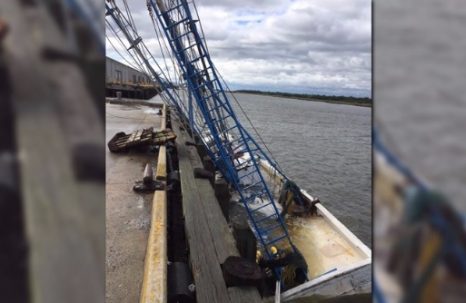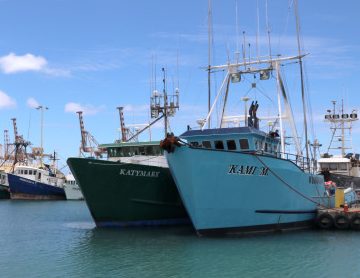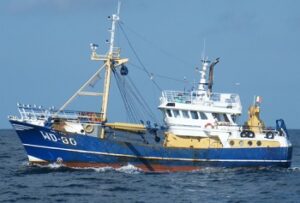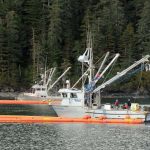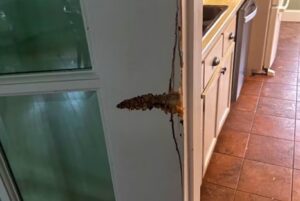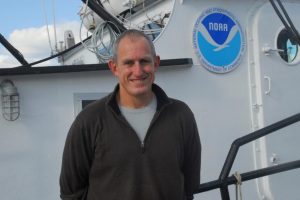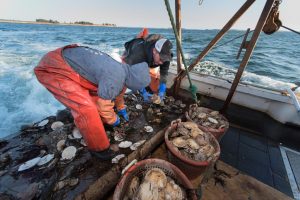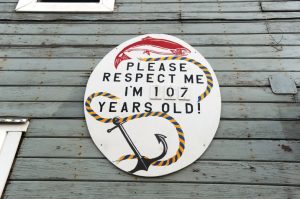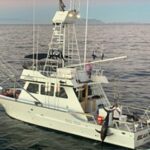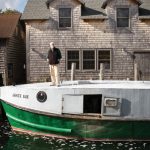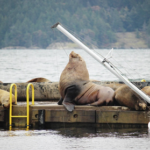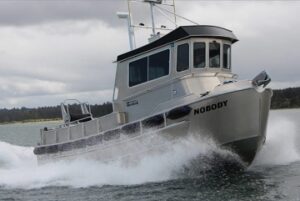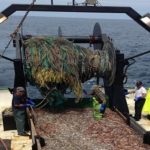Monthly Archives: October 2016
Alaska’s Bering Sea snow crab quota down 50 percent
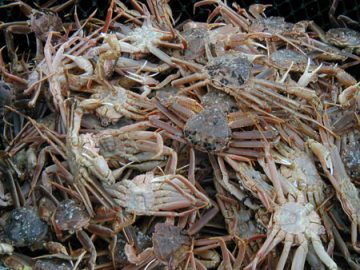 In mixed news for Alaska’s crabbers, the state’s Department of Fish and Game announced the opening of the Bering Sea snow crab season will take place on 15 October, but with an allotted catch that is half that of last season’s. A report released Thursday, 6 October by Fish and Game put the total allowable catch (TAC) for the 2016/17 season at 21.57 million pounds, which would be the fishery’s lowest in 45 years. Around 19.4 million pounds of the TAC will go to the individual fishing quota, with the rest going to the community development quota. “We’ve seen a declining trend since the 2006/7 season,” said Robert J. Foy, the head of NOAA’s “Crab Lab” in Kodiak. Read the rest here 11:44
In mixed news for Alaska’s crabbers, the state’s Department of Fish and Game announced the opening of the Bering Sea snow crab season will take place on 15 October, but with an allotted catch that is half that of last season’s. A report released Thursday, 6 October by Fish and Game put the total allowable catch (TAC) for the 2016/17 season at 21.57 million pounds, which would be the fishery’s lowest in 45 years. Around 19.4 million pounds of the TAC will go to the individual fishing quota, with the rest going to the community development quota. “We’ve seen a declining trend since the 2006/7 season,” said Robert J. Foy, the head of NOAA’s “Crab Lab” in Kodiak. Read the rest here 11:44
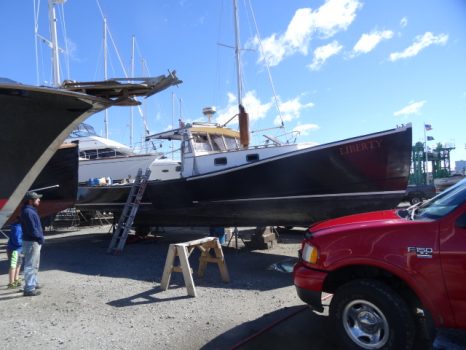
Port Clyde Community behind him, Liberty owner vows to carry on
Whoever has been sinking Tony Hooper’s lobster boat is still out there. They have brazenly sunk his vessel, Liberty, three times since Aug. 17, with no apparent fear of getting caught. The first time, they sent the boat 30 feet underwater. Hooper hauled it out of the water, did the necessary repairs, and got back to work. Six weeks later, they cut the boat’s hoses and bilge wires and set it adrift, to be found beached on Raspberry Island. And just days after that, they did the same thing again, leaving the Liberty to wash up, after having been submerged, on another nearby island. Each time, Hooper, 37, of Port Clyde, has wasted little time repairing the boat and readying it for the work that supports his three young children and their mother. “This person ain’t going to get the best of me,” he said Read the story here 11:23
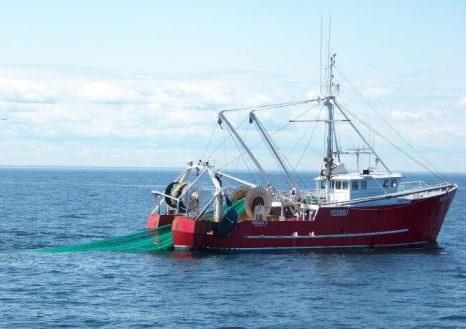
Coast Guard, NOAA Discuss Safety Requirements For Vessels Chartered To Support Scientific Research
Commercial vessels, in particular commercial fishing vessels, are often chartered by the National Oceanic and Atmospheric Administration (NOAA) to engage in scientific research. There is a long-standing agreement between the Coast Guard and NOAA National Marine Fisheries Service (NMFS) dating back to 1980, which requires NOAA to notify the Coast Guard prior to a commercial vessel being contracted. When that notification is made, the Coast Guard coordinates an inspection, if necessary, to ensure the vessel is in compliance with applicable safety requirements. Further, some vessels may be authorized to operate as research vessels; this also involves a Coast Guard inspection and the issuance of “letter of designation” as a research vessel. Read the rest here 10:06
Judge blocks closure of southern flounder fishing. Will it be appealed?
A Wake County Superior Court judge has issued an injunction preventing the 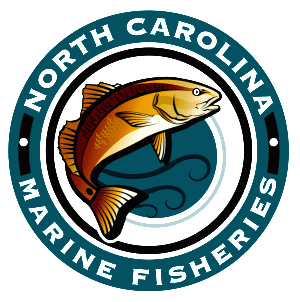 N.C. Marine Fisheries Commission from closing the entire southern flounder fishery from October 16 through January 1. During its November 2015 meeting at Jeanette’s Pier, the commission voted 6-3 to shut down both the commercial and recreational fisheries for southern flounder during the fourth quarter of 2016. A lawsuit was filed by the New Bern-based North Carolina Fisheries Association, the Carteret County Fishermen’s Association, as well as Dare, Hyde and Carteret counties, against the commission’s action, and resulted in a temporary restraining order being issued on Sept. 28. After two hours of testimony on Oct. 6 from attorneys representing the NCFA and the state, Superior Court Judge John Jolly, Jr. issued an order preventing the Division of Marine Fisheries from instituting the October 16 closure. When the MFC voted for the closure last year, interest groups from the commercial fishing industry, which were opposed to the ban, lined up against the recreation-oriented Coastal Conservation Association and Recreational Fishing Alliance. Read the story here 09:39
N.C. Marine Fisheries Commission from closing the entire southern flounder fishery from October 16 through January 1. During its November 2015 meeting at Jeanette’s Pier, the commission voted 6-3 to shut down both the commercial and recreational fisheries for southern flounder during the fourth quarter of 2016. A lawsuit was filed by the New Bern-based North Carolina Fisheries Association, the Carteret County Fishermen’s Association, as well as Dare, Hyde and Carteret counties, against the commission’s action, and resulted in a temporary restraining order being issued on Sept. 28. After two hours of testimony on Oct. 6 from attorneys representing the NCFA and the state, Superior Court Judge John Jolly, Jr. issued an order preventing the Division of Marine Fisheries from instituting the October 16 closure. When the MFC voted for the closure last year, interest groups from the commercial fishing industry, which were opposed to the ban, lined up against the recreation-oriented Coastal Conservation Association and Recreational Fishing Alliance. Read the story here 09:39
Sustainable Shark Alliance register’s to lobby with the sole goal of defeating the Shark Fin Trade Elimination Act
 The bill, sponsored by Sen. -Cory Booker (D-N.J.) and Del. Gregorio Sablan (D-Northern Mariana Islands), seeks to expand on Congress’s ban on shark finning, in which fishermen cut off the fish’s fin and return it to the ocean, usually to die. Supporters say finning is cruel and has decimated populations of shark species, including endangered ones. The bill has dozens of co-sponsors, including House Foreign Affairs Committee Chairman Ed Royce (R-Calif.) and Senate Energy and Natural Resources Committee Chairwoman Lisa Murkowski. It was introduced at a news conference with actor Morgan Freeman. But the shark industry, which supports the ban on finning, says the bill would shut down much of the industry. Domestic fisherman use more than just the fin, but the fin — usually exported to China for use in soup and other culinary purposes — represents about half the monetary value of the fish, said Shaun Gehan, the lobbyist for the ad-hoc coalition. “This bill simply takes the U.S. fisherman and pretty much puts him out of business, only to reward our small portion of the international market to the bad actors,” said Shaun Gehan, who estimated that U.S. fishermen fulfill about 3 percent of the international market for shark fins. Read the story here 09:04
The bill, sponsored by Sen. -Cory Booker (D-N.J.) and Del. Gregorio Sablan (D-Northern Mariana Islands), seeks to expand on Congress’s ban on shark finning, in which fishermen cut off the fish’s fin and return it to the ocean, usually to die. Supporters say finning is cruel and has decimated populations of shark species, including endangered ones. The bill has dozens of co-sponsors, including House Foreign Affairs Committee Chairman Ed Royce (R-Calif.) and Senate Energy and Natural Resources Committee Chairwoman Lisa Murkowski. It was introduced at a news conference with actor Morgan Freeman. But the shark industry, which supports the ban on finning, says the bill would shut down much of the industry. Domestic fisherman use more than just the fin, but the fin — usually exported to China for use in soup and other culinary purposes — represents about half the monetary value of the fish, said Shaun Gehan, the lobbyist for the ad-hoc coalition. “This bill simply takes the U.S. fisherman and pretty much puts him out of business, only to reward our small portion of the international market to the bad actors,” said Shaun Gehan, who estimated that U.S. fishermen fulfill about 3 percent of the international market for shark fins. Read the story here 09:04
Millions for harbor infrastructure improvements in West Nova
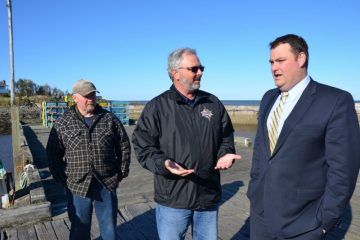 “As you know, commercial fishing is the cornerstone of many coastal communities across the province and the country,” Fraser said. “In 2015 commercial fishing contributed $6 billion to the Canadian economy. That figure represents a $1 billion increase over the previous year.” Fraser said the industry employs 76,000 Canadians and that fish and seafood is now the country’s second largest food exporter after wheat. “One of the pillars of this industry is our national network of small craft harbours,” said Fraser. “Our government supports over 1,000 of these harbours across Canada in communities such as yours. Keeping each of them safe, accessible, and in good repair requires considerable time, effort, and money.” The Projects – Camp Cove (Lower Argyle), Cape St. Mary’s, Parker’s Cove, Pinkney’s Point, Wedge Point (Wedgeport), Yarmouth Bar Read the story here 08:14:50
“As you know, commercial fishing is the cornerstone of many coastal communities across the province and the country,” Fraser said. “In 2015 commercial fishing contributed $6 billion to the Canadian economy. That figure represents a $1 billion increase over the previous year.” Fraser said the industry employs 76,000 Canadians and that fish and seafood is now the country’s second largest food exporter after wheat. “One of the pillars of this industry is our national network of small craft harbours,” said Fraser. “Our government supports over 1,000 of these harbours across Canada in communities such as yours. Keeping each of them safe, accessible, and in good repair requires considerable time, effort, and money.” The Projects – Camp Cove (Lower Argyle), Cape St. Mary’s, Parker’s Cove, Pinkney’s Point, Wedge Point (Wedgeport), Yarmouth Bar Read the story here 08:14:50
BOMBSHELL REPORT! More than half of the fish and shellfish landed from UK EEZ caught by European fishing boats.
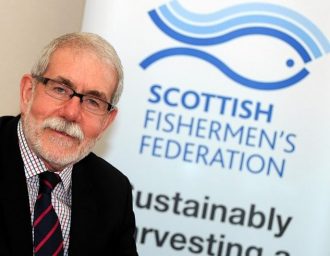 Brexit has been welcomed as a “sea of opportunity” for Scottish fishers after a new report revealed foreign boats took out 58% of fish and shellfish from UK coastal waters – a catch worth up to £400million a year, it was claimed. The report found that EU boats caught around 650,000 tonnes of fish and shellfish in UK’s exclusive economic zone (EEZ) between 2012 and 2014. In contrast, UK fishing boats fishing in EU waters landed on average 90,000 tonnes of fish and shellfish – worth only about £100million. The report, produced by the NAFC Marine Centre UHI in Shetland, found that more than half – 51% – of the fish and shellfish landed from the Scottish part of the EEZ was caught by European fishing boats. The Scottish Fishermen’s Federation (SFF) claimed that exit from the EU will “enable the UK to assert control over its 200-mile EEZ”, which means that foreign vessels could not then fish in the zone without express consent. The body added that the report was a “bombshell” and urged the UK and Scottish Government to work together “to ensure that the best possible deal is reached for our hardworking fishermen”. Read the rest here 19:41
Brexit has been welcomed as a “sea of opportunity” for Scottish fishers after a new report revealed foreign boats took out 58% of fish and shellfish from UK coastal waters – a catch worth up to £400million a year, it was claimed. The report found that EU boats caught around 650,000 tonnes of fish and shellfish in UK’s exclusive economic zone (EEZ) between 2012 and 2014. In contrast, UK fishing boats fishing in EU waters landed on average 90,000 tonnes of fish and shellfish – worth only about £100million. The report, produced by the NAFC Marine Centre UHI in Shetland, found that more than half – 51% – of the fish and shellfish landed from the Scottish part of the EEZ was caught by European fishing boats. The Scottish Fishermen’s Federation (SFF) claimed that exit from the EU will “enable the UK to assert control over its 200-mile EEZ”, which means that foreign vessels could not then fish in the zone without express consent. The body added that the report was a “bombshell” and urged the UK and Scottish Government to work together “to ensure that the best possible deal is reached for our hardworking fishermen”. Read the rest here 19:41
First U.S. Offshore Wind Plant Costs $17,600 Per Home Powered
 America’s first offshore wind power plant will cost about $17,600 dollars to build per home it will power. Three miles off the coast of Block Island, Rhode Island, the wind farm is supposed to generate enough energy to power 17,000 homes, but will cost $300 million to build five turbines. This cost is just to build the turbines, not to operate them. The extremely high cost of offshore wind doesn’t worry environmentalists and progressives however, because, as Salon.com says about the project, “it’s the precedent that counts.” Despite the extremely high cost, federal officials want to power a whopping 23 million homes with offshore wind by the year 2050. Read the rest here 15:18
America’s first offshore wind power plant will cost about $17,600 dollars to build per home it will power. Three miles off the coast of Block Island, Rhode Island, the wind farm is supposed to generate enough energy to power 17,000 homes, but will cost $300 million to build five turbines. This cost is just to build the turbines, not to operate them. The extremely high cost of offshore wind doesn’t worry environmentalists and progressives however, because, as Salon.com says about the project, “it’s the precedent that counts.” Despite the extremely high cost, federal officials want to power a whopping 23 million homes with offshore wind by the year 2050. Read the rest here 15:18
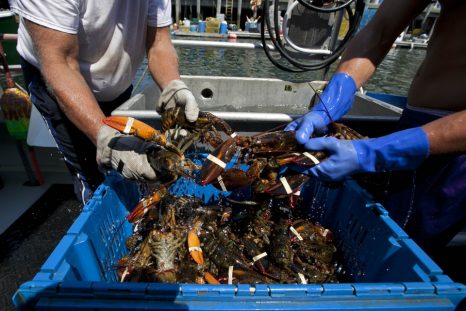
In a small marine community in Maine, Lobsters Are Keeping Students in School
Three hours from Portland, Maine, and two hours from the state capital of Augusta, picturesque Deer Isle has two towns on it (Deer Isle and Stonington), a combined year-round population of about 2,500 people, and not a single fast-food chain—or any chain store for that matter. Those who live beyond the narrow, turquoise suspension bridge connecting Deer Isle to the mainland are called PFAs (“people from away”), even if they work or attend school on the island. At the southern end of the predominantly middle-class, overwhelmingly white island lies a small but bustling harbor. In 2015, Stonington port brought in $63.8 million worth of lobster, landing it the title of Maine’s no. 1 commercial fishing port. The influence of maritime culture is evident at every turn: The local convenience store opens at 3:30 a.m. in the summers to accommodate early-to-rise fishermen.,,But getting young people to stay in school is another story. At the island’s only high school, Deer Isle-Stonington High School (DISHS), there has been a sense among some students that school is just standing in the way of going off and making money, and some of their parents see school as basically a lousy babysitter. Read the story here 14:38
Two Close Calls!
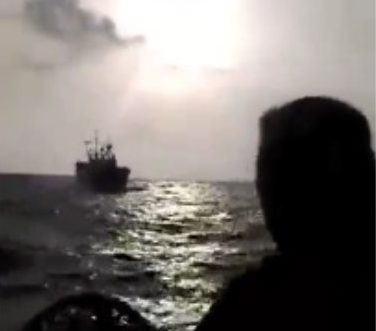 It was a close call for the crew of a small fishing boat in West Cork recently when a much larger boat steamrollered passed them with just a whisker of space keeping them safe. The crew of the inshore potter Celtic Dawn were hauling pots off the West Cork coast when a Spanish vessel approached at a rapid pace and did not appear to see the little fishing boat at work. The Castletownbere crew were saved by a matter of metres, and the captain of the fishing boat was non-too-impressed by the encounter. Watch the video here THIS is the moment a nuclear submarine surfaced next to a pair of stunned fishermen as they were out catching crabs. Video filmed on the men’s mobile phones captures the moments after the colossal vessel broke the surface next to their tiny dinghy. Watch the video here 12:22
It was a close call for the crew of a small fishing boat in West Cork recently when a much larger boat steamrollered passed them with just a whisker of space keeping them safe. The crew of the inshore potter Celtic Dawn were hauling pots off the West Cork coast when a Spanish vessel approached at a rapid pace and did not appear to see the little fishing boat at work. The Castletownbere crew were saved by a matter of metres, and the captain of the fishing boat was non-too-impressed by the encounter. Watch the video here THIS is the moment a nuclear submarine surfaced next to a pair of stunned fishermen as they were out catching crabs. Video filmed on the men’s mobile phones captures the moments after the colossal vessel broke the surface next to their tiny dinghy. Watch the video here 12:22
The ‘great Brexit betrayal’! PM’s plan to adopt EU laws blasted by furious fishermen
 Ahead of the Conservative Party conference last week, Theresa May set out her proposal for a Great Repeal Bill to end the supremacy of Brussels’ law over UK legislation on the day Britain leaves the EU. But, despite returning lawmaking sovereignty to Westminster, the Bill will also convert existing EU law into domestic law in a bid to ensure continuity. Fishing For Leave have voiced their anger at the Prime Minister’s approach to overturning Brussels’ rule, fearing it could mean British fishermen will still be subject to the “disastrous” EU’s Common Fisheries Policy (CFP) even outside the bloc. The group have declared the Great Repeal Bill should be of “dire concern” and will represent an “unacceptable sell out of Brexit”. Video, read the story here 11:46
Ahead of the Conservative Party conference last week, Theresa May set out her proposal for a Great Repeal Bill to end the supremacy of Brussels’ law over UK legislation on the day Britain leaves the EU. But, despite returning lawmaking sovereignty to Westminster, the Bill will also convert existing EU law into domestic law in a bid to ensure continuity. Fishing For Leave have voiced their anger at the Prime Minister’s approach to overturning Brussels’ rule, fearing it could mean British fishermen will still be subject to the “disastrous” EU’s Common Fisheries Policy (CFP) even outside the bloc. The group have declared the Great Repeal Bill should be of “dire concern” and will represent an “unacceptable sell out of Brexit”. Video, read the story here 11:46
First in Maine, Now in Massachusetts. Toxic algae outbreak halts shellfishing in Buzzards Bay, Mount Hope Bay
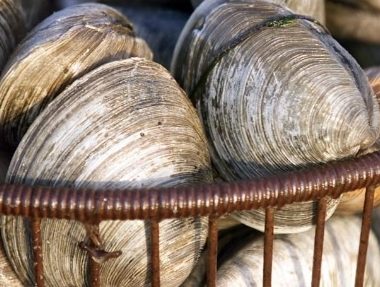 The state’s Division of Marine Fisheries has banned shellfishing in the west side of Buzzards Bay and in Mount Hope Bay because of a breakout of toxic algae late last week. The ban affects all SouthCoast towns and cities. “As a result of the closure, digging, harvesting, collecting and/or attempting to dig, harvest or collect shellfish, and the possession of shellfish, is prohibited in Bourne, Dartmouth, Fairhaven, Falmouth, Gosnold, Marion, Mattapoisett, New Bedford, Swansea and Westport,” the state said in a press release. The trouble concerns a toxic kind of phytoplankton termed Pseudo-Nitzschia. This algae can produce domoic acid, a biotoxin that concentrates in filter-feeding shellfish. Read the story here 08:37
The state’s Division of Marine Fisheries has banned shellfishing in the west side of Buzzards Bay and in Mount Hope Bay because of a breakout of toxic algae late last week. The ban affects all SouthCoast towns and cities. “As a result of the closure, digging, harvesting, collecting and/or attempting to dig, harvest or collect shellfish, and the possession of shellfish, is prohibited in Bourne, Dartmouth, Fairhaven, Falmouth, Gosnold, Marion, Mattapoisett, New Bedford, Swansea and Westport,” the state said in a press release. The trouble concerns a toxic kind of phytoplankton termed Pseudo-Nitzschia. This algae can produce domoic acid, a biotoxin that concentrates in filter-feeding shellfish. Read the story here 08:37

Is Environmental Defense Fund Controlling Louisiana’s Department Of Wildlife And Fisheries?
By now our readers are surely familiar with the very strange behavior of Louisiana Department of Wildlife and Fisheries secretary Charlie Melancon with respect to his opposition to a bill brought by most of Louisiana’s congressional delegation that would put individual Gulf states, rather than the federal government, in control of the red snapper fishery in the Gulf of Mexico. If you’re not up to speed on Melancon’s antics and escalating feud with a key member of the delegation, Baton Rouge congressman Garret Graves, we offered a primer here. Most of the speculation you may have seen involves the idea that several of the larger commercial fishing concerns along the Gulf coast, who benefit from a crony-capitalist scheme wherein shares of the red snapper market have been allocated based on incumbency – the owners of those concerns have been given the moniker “Sea Lords” since the red snapper catch largely resembles a feudal system of sorts – have essentially bought Melancon and his opposition to the bill Graves is proposing is a product of that purchase. Graves’ idea to put the state in charge of the red snapper fishery would break up the current allocation scheme and put the Sea Lords out of commission in Louisiana, or at least make their incumbency a matter which would be up for grabs. Read the story here 08:10
Is John Risely out to gut Ocean Choice International like a fish? By Ryan Cleary
 Nova Scotian John Risley who led a hostile takeover of Fishery Products International in 2001 that led to the company’s demise and the loss of hundreds of rural jobs — appears to be attempting another such takeover. This time of Newfoundland and Labrador-based Ocean Choice International — which bills itself as Canada’s “largest wild fish quota holder,” including highly lucrative snow crab, shrimp, scallops, cod, and turbot. If Risley succeeds he could potentially do to OCI what he did to FPI — gut it like a fish. I say that Risley is no friend of Newfoundland and Labrador, and if he gets his hands on OCI’s quotas the Grand Banks will be sold off to the highest bidder.Ryan Cleary is a former Newfoundland and Labrador MP, long-time journalist, and leader of FISH-NL, a group attempting to represent the province’s fish harvesters in a break-away union from the FFAW. Read the full piece, click here 22:21
Nova Scotian John Risley who led a hostile takeover of Fishery Products International in 2001 that led to the company’s demise and the loss of hundreds of rural jobs — appears to be attempting another such takeover. This time of Newfoundland and Labrador-based Ocean Choice International — which bills itself as Canada’s “largest wild fish quota holder,” including highly lucrative snow crab, shrimp, scallops, cod, and turbot. If Risley succeeds he could potentially do to OCI what he did to FPI — gut it like a fish. I say that Risley is no friend of Newfoundland and Labrador, and if he gets his hands on OCI’s quotas the Grand Banks will be sold off to the highest bidder.Ryan Cleary is a former Newfoundland and Labrador MP, long-time journalist, and leader of FISH-NL, a group attempting to represent the province’s fish harvesters in a break-away union from the FFAW. Read the full piece, click here 22:21
Pricey sea cucumbers face increasing sea otter appetites
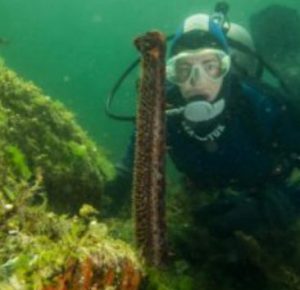 Sea cucumbers are the most valuable of Alaska’s dive fisheries and give a nice boost to coastal towns, especially in Southeast. Annual harvests each October hover around one million pounds and attract nearly 200 divers, who will fetch between $4 to $5 a pound for their pickings. The harvest used to approach two million pounds but sea otters have cleaned out cucumbers in many areas over the past decade. None of the areas they have gone back and resurveyed have they seen any sea cucumbers. It’s not like the otter come in and move on and the population rebounds. The otters stay. We’ve lost on an annual basis between 500-000 to 600,000 pounds of product and the trend is downward. Audio report, read the rest here 16:46
Sea cucumbers are the most valuable of Alaska’s dive fisheries and give a nice boost to coastal towns, especially in Southeast. Annual harvests each October hover around one million pounds and attract nearly 200 divers, who will fetch between $4 to $5 a pound for their pickings. The harvest used to approach two million pounds but sea otters have cleaned out cucumbers in many areas over the past decade. None of the areas they have gone back and resurveyed have they seen any sea cucumbers. It’s not like the otter come in and move on and the population rebounds. The otters stay. We’ve lost on an annual basis between 500-000 to 600,000 pounds of product and the trend is downward. Audio report, read the rest here 16:46
WWF calls for shut down of commercial fishing to save Pacific bluefin tuna
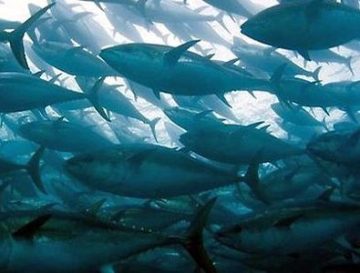 World Wildlife Fund (WWF) has called for the suspension of commercial fishing to save Pacific bluefin tuna because of the inaction of responsible agencies in addressing the decrease in stock. WWF Oceans and Seafood group leader Dr Aiko Yamauchi said members of the Northern Committee (NC) of the Western and Central Pacific Fisheries Commission (WCPFC) have failed to agree to an urgently-needed recovery plan to save Pacific bluefin tuna. WCPFC was established by the Convention for the conservation and management of highly migratory fish stocks in the Western and Central Pacific Ocean “Because of the lack of progress and the repeated inaction of the responsible bodies, the Pacific bluefin stock will continue to teeter on the edge of collapse,” Dr Yamauchi said. “We call for a full suspension of commercial fishing of this species until a Pacific-wide rebuilding and management plan has been agreed. Link 14:35
World Wildlife Fund (WWF) has called for the suspension of commercial fishing to save Pacific bluefin tuna because of the inaction of responsible agencies in addressing the decrease in stock. WWF Oceans and Seafood group leader Dr Aiko Yamauchi said members of the Northern Committee (NC) of the Western and Central Pacific Fisheries Commission (WCPFC) have failed to agree to an urgently-needed recovery plan to save Pacific bluefin tuna. WCPFC was established by the Convention for the conservation and management of highly migratory fish stocks in the Western and Central Pacific Ocean “Because of the lack of progress and the repeated inaction of the responsible bodies, the Pacific bluefin stock will continue to teeter on the edge of collapse,” Dr Yamauchi said. “We call for a full suspension of commercial fishing of this species until a Pacific-wide rebuilding and management plan has been agreed. Link 14:35
House fisheries committee to meet on Alaska and British Columbia transboundary mining issues Oct. 12
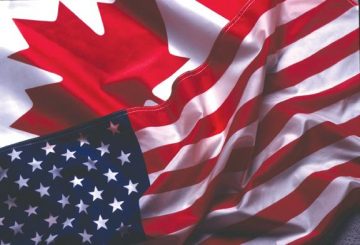 The governments of Alaska and British Columbia announced on Oct. 6 the signing of a non-binding agreement focused on transboundary waters. Federal level involvement of the governments of the United States and Canada is needed, however, to ensure that enforceable measures and financial liabilities are identified to protect habitat critical to the economy and lifestyle of Southeast Alaska. The Alaska House Fisheries Committee will hold a public hearing on transboundary mining issues Oct. 12 to hear from fishermen, business owners, municipal and tribal leaders and other concerned citizens. The session will run from 10 a.m. to 4 p.m., with a half hour break from noon to 12:30 p.m. The toll free call-in number is 1-844-586-9085. The session was prompted by growing concerns over potential adverse impact on salmon habitat in transboundary waterways from mining development near the headwaters of rivers flowing from British Columbia into Southeast Alaska. Link 13:43
The governments of Alaska and British Columbia announced on Oct. 6 the signing of a non-binding agreement focused on transboundary waters. Federal level involvement of the governments of the United States and Canada is needed, however, to ensure that enforceable measures and financial liabilities are identified to protect habitat critical to the economy and lifestyle of Southeast Alaska. The Alaska House Fisheries Committee will hold a public hearing on transboundary mining issues Oct. 12 to hear from fishermen, business owners, municipal and tribal leaders and other concerned citizens. The session will run from 10 a.m. to 4 p.m., with a half hour break from noon to 12:30 p.m. The toll free call-in number is 1-844-586-9085. The session was prompted by growing concerns over potential adverse impact on salmon habitat in transboundary waterways from mining development near the headwaters of rivers flowing from British Columbia into Southeast Alaska. Link 13:43
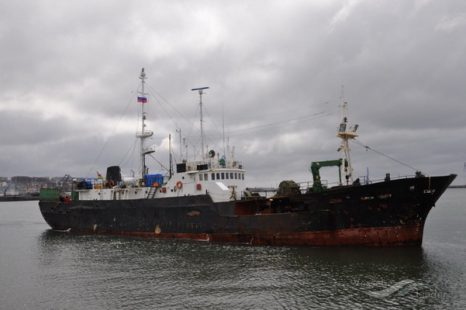
Trawler Sky Wind arrested for illegal crab fishing in Sakhalin
Fishing trawler Sky Wind was arrested and fined for illegal crab fishing in the Russian waters near Sakhalin. The vessel was detained by the boarded guard and navy for routine check, but on board the inspectors found 1 ton of frozen crab products produced from 2.6 tons of live crab. The ship was escorted to the Russian port, where was held rapid administrative procedure for violating the rules for fishing. The shipowner of the fishing trawler was fined with 2.5 million rubles (about 40,000 USD), while the Master received smaller fine. The vessel was seized for the income of the Russian state, until the fine is transfered. The crew is currently in good health conditions and has enough supplies. Read the story here 13:09
Researchers: Global Warming Could Wipe Out Maine Lobsters in 85 Years!
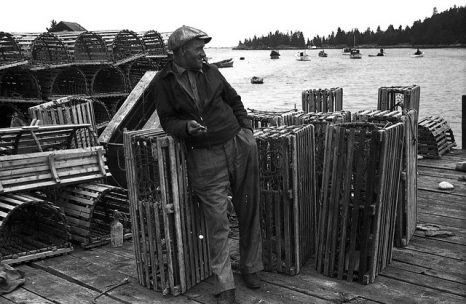 The Gulf of Maine is warming at an alarming rate. Research by the National Oceanic and Atmospheric Administration shows ocean temperatures are rising at three times the rate of global averages. This increase in temperatures is linked to the collapse of the New England cod population, and new research shows the fate of the Maine lobster is likely similar. A new report from the University of Maine Darling Marine Center and the Bigelow Laboratory for Ocean Sciences predicts the Maine lobster population will be wiped out by 2100 due to climate change. The study examined how lobster larvae are impacted by rising ocean temperatures and ocean acidification. Although acidification seems to have no significant impact on the larvae, warming temperatures are a different story. Lobsters reared in water that is 3 degrees Celsius warmer than current temperatures in the western Gulf of Maine had bleak survival rates. Read the rest here 11:51
The Gulf of Maine is warming at an alarming rate. Research by the National Oceanic and Atmospheric Administration shows ocean temperatures are rising at three times the rate of global averages. This increase in temperatures is linked to the collapse of the New England cod population, and new research shows the fate of the Maine lobster is likely similar. A new report from the University of Maine Darling Marine Center and the Bigelow Laboratory for Ocean Sciences predicts the Maine lobster population will be wiped out by 2100 due to climate change. The study examined how lobster larvae are impacted by rising ocean temperatures and ocean acidification. Although acidification seems to have no significant impact on the larvae, warming temperatures are a different story. Lobsters reared in water that is 3 degrees Celsius warmer than current temperatures in the western Gulf of Maine had bleak survival rates. Read the rest here 11:51
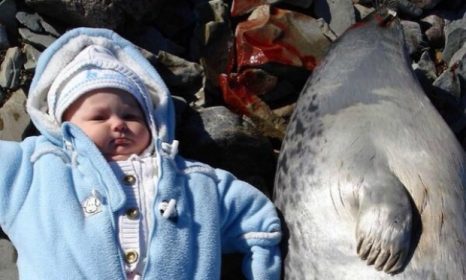
Tanya Tagaq: Anti-sealing movement is ‘the bad guy’
The anti-sealing movement targets the wrong people, says Inuk throat singer Tanya Tagaq. Tagaq, delivering a keynote speech Sunday at the Inuit Studies Conference at Memorial University, touched on her pro-sealing views that drew criticism n 2014, when she tweeted a picture of her baby daughter next to a freshly killed seal near her hometown of Cambridge Bay, Nunavut. She displayed the picture during her speech at MUN’s Angus Bruneau Centre on Sunday. “This picture caused a shitstorm,” said Tagaq, who explained she posted it in support of a social media campaign to educate people on human seal hunting. “Inuit are being cornered into an economic world, economic system, a sedentary way of life.” The Inuit are not in control of their own resources, said Tagaq.”Before the seal ban, we were thriving, being able to provide for our families and buy hunting supplies and pay rent by doing what we’ve always done, which is loving and protecting our seals and living amongst them and eating them and utilizing them.” Read the story here 09:54
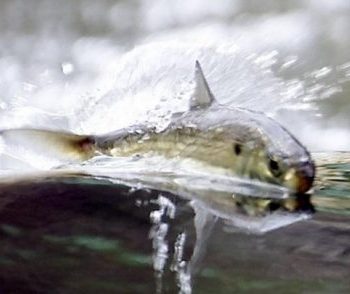
Trouble for Bay State River herring trapped by drought in Lakeville, Middleboro, Rochester
The historic drought trapped at least a million young river herring in Assawompsett Pond as they tried to swim out to the ocean, and a state biologist says countless more are likely stuck up and down the Massachusetts coast. The water in Assawompsett has been too low to flow over the spillway that leads to the Nemasket River, on the Lakeville-Middleboro line. Each spring, adult herring make their way upstream to spawn. Hatchlings spend the summer in inland waters. In late summer, fall, and into the winter, young fish swim out to the ocean. If they get stuck, it can present some problems. “My understanding is they can winter over if they have to, but it’s not a preferred option,” Cavanaugh said. If the water gets too cold, or if an ice cap reduces oxygenation, it can kill fish. Read the story here 08:30
What the UK’s fishing industry wants from Brexit
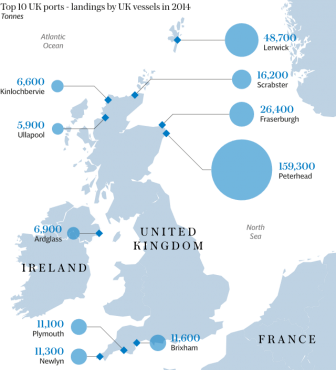 By the time dawn breaks behind the tall towers of Canary Wharf in London, home to dozens of banks and other financial institutions, Bill Thornton is already halfway through his day. A trader for 35 years, he is used to hard work and waking up in the early hours of the morning. But Thornton is not a banker. He doesn’t wear a suit or tie and there is not a briefcase in sight. His domain lies in the shadow of the big banks – in Billingsgate fish market. At James Nash & Son, the Billingsgate wholesale fish merchant where Thornton works, you have to be up early to see the array of fish on display: cod from Peterhead, skate from Aberdeen and lemon sole from Newlyn. Most have travelled from trawler to market within 24 hours. Many here are celebrating the Brexit vote. The fishing industry was a focal point of the EU referendum campaign. Nigel Farage, the former Ukip leader, has since said that the industry is a touchstone for Brexit. Leaving the EU means “getting our fishing waters back” – or we haven’t really left at all. Thornton, who voted for Brexit, has felt the impact of the EU’s common fisheries policy personally. “It decimated the fishing industry,” he says. “Our price of entry to the EU was giving up our fishing rights. Ted Heath sold us down the river.” Read the story here 07:55
By the time dawn breaks behind the tall towers of Canary Wharf in London, home to dozens of banks and other financial institutions, Bill Thornton is already halfway through his day. A trader for 35 years, he is used to hard work and waking up in the early hours of the morning. But Thornton is not a banker. He doesn’t wear a suit or tie and there is not a briefcase in sight. His domain lies in the shadow of the big banks – in Billingsgate fish market. At James Nash & Son, the Billingsgate wholesale fish merchant where Thornton works, you have to be up early to see the array of fish on display: cod from Peterhead, skate from Aberdeen and lemon sole from Newlyn. Most have travelled from trawler to market within 24 hours. Many here are celebrating the Brexit vote. The fishing industry was a focal point of the EU referendum campaign. Nigel Farage, the former Ukip leader, has since said that the industry is a touchstone for Brexit. Leaving the EU means “getting our fishing waters back” – or we haven’t really left at all. Thornton, who voted for Brexit, has felt the impact of the EU’s common fisheries policy personally. “It decimated the fishing industry,” he says. “Our price of entry to the EU was giving up our fishing rights. Ted Heath sold us down the river.” Read the story here 07:55
Fishing Industry faces tough times – Sam Parisi
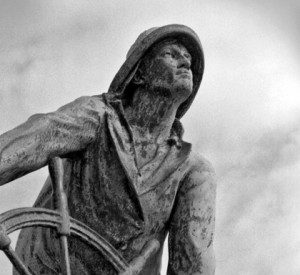 US Fishermen from all over are feeling the effects of NOAA and conservation groups that are making it very difficult for our fishing fleets on every coast. Every day there is anther obstacle for our fishermen, the most recent on the East Coast. President Obama has designated a large area of Cape Cod, the Northeast Canyons and Seamounts Marine National Monument. I fished those waters back in the late 60,s for whiting and lobster. Fishermen depend on those deep waters for lobsters. Although the President, after up roars from the lobstermen, has given them seven years to vacate, in the end those lobstermen will lose their rich grounds. When does it end? Every day some one else comes up with a brain storm and there are so many people out there that no idea of the effect, but think it is a good idea to protect whatever, not thinking of the harm to our fishermen. I believe the deck is stacked and our fishermen do not stand a chance to exist. We need help from our political leaders. I have heard over and over “we will help”, with good intentions but the fact remains NOAA holds all the cards. We have no say. We need political leader’s that will stand up to NOAA on our behalf, and follow through. We need help now. Here are the basic problems that need attention. Language written into MSA that would unlock the ironclad grip NOAA has on the “best available science” and accept other independent scientific data. SK Grant money needs to be removed from NOAA. Senator Sullivan of Alaska has such a bill pending and finally our fishermen should not have to pay for monitoring that is NOAA’s responsibility. Thanks for listing. Sam Parisi, Proud to be a fishermen. 19:24
US Fishermen from all over are feeling the effects of NOAA and conservation groups that are making it very difficult for our fishing fleets on every coast. Every day there is anther obstacle for our fishermen, the most recent on the East Coast. President Obama has designated a large area of Cape Cod, the Northeast Canyons and Seamounts Marine National Monument. I fished those waters back in the late 60,s for whiting and lobster. Fishermen depend on those deep waters for lobsters. Although the President, after up roars from the lobstermen, has given them seven years to vacate, in the end those lobstermen will lose their rich grounds. When does it end? Every day some one else comes up with a brain storm and there are so many people out there that no idea of the effect, but think it is a good idea to protect whatever, not thinking of the harm to our fishermen. I believe the deck is stacked and our fishermen do not stand a chance to exist. We need help from our political leaders. I have heard over and over “we will help”, with good intentions but the fact remains NOAA holds all the cards. We have no say. We need political leader’s that will stand up to NOAA on our behalf, and follow through. We need help now. Here are the basic problems that need attention. Language written into MSA that would unlock the ironclad grip NOAA has on the “best available science” and accept other independent scientific data. SK Grant money needs to be removed from NOAA. Senator Sullivan of Alaska has such a bill pending and finally our fishermen should not have to pay for monitoring that is NOAA’s responsibility. Thanks for listing. Sam Parisi, Proud to be a fishermen. 19:24
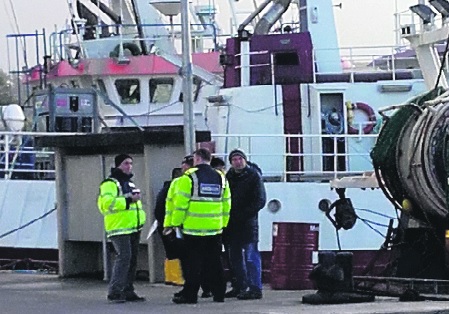
Raid on 20 Beara trawlers by gardai, Revenue was ‘utter overkill’ – skipper
A major inter-agency sweep of 20 boats was carried out in Castletownbere on Wednesday morning to see if illegal immigrant workers were on board. A skipper in the area estimated that there was a combined force of 50 people – including detectives, Revenue Commissioners, and members of the Workplace Relations Commission (WRC) – engaged in the searches at Dinish Island, between 9am and noon on Wednesday. The skipper said five men – two detectives, two WRC staff, and a member of the Revenue team – boarded his boat shortly after 9.30am. The skipper said he employs one non-EU worker on that boat and that everything – which had already been checked out a month ago – was found to be fully compliant. ‘I have nothing to hide,’ said the skipper, who suggested: ‘A phone call wouldn’t have gone amiss.’ And he described the whole operation as being: ‘Like using a sledgehammer to squash a peanut – it was pure and utter overkill.’ Read the story here 16:37
Tips on how to get a job in the Alaska fishing business
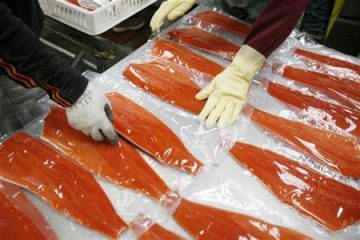 Work in the Alaska commercial fishing industry is a great way to save up a lot of money in a short amount of time. After the fishing season many employees use the time and money that they now have for college, to buy property, to start a new business, or to travel the world. The industry employs over 65,000 people every year, so there is plenty of room for newcomers to get a job. Work hours generally range from 12 to 16 hours a day, up to seven days a week. Typically processors make $750 to $1,500 a week. Fishermen earn around $1,000 to $2,500 a week (and sometimes more!). Besides the pay, many employers in the industry also offer free room and board and free round-trip airfare from the point of hire (usually Seattle, WA) to Alaska. Processing jobs are the easiest to get. Read the rest here 14:35
Work in the Alaska commercial fishing industry is a great way to save up a lot of money in a short amount of time. After the fishing season many employees use the time and money that they now have for college, to buy property, to start a new business, or to travel the world. The industry employs over 65,000 people every year, so there is plenty of room for newcomers to get a job. Work hours generally range from 12 to 16 hours a day, up to seven days a week. Typically processors make $750 to $1,500 a week. Fishermen earn around $1,000 to $2,500 a week (and sometimes more!). Besides the pay, many employers in the industry also offer free room and board and free round-trip airfare from the point of hire (usually Seattle, WA) to Alaska. Processing jobs are the easiest to get. Read the rest here 14:35
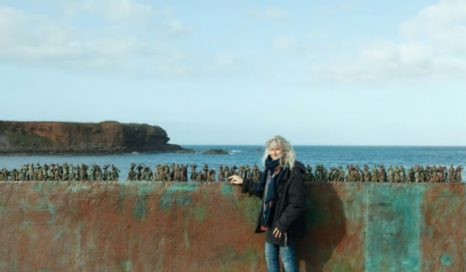
“Black Friday” Storm Memorial – 189 Eyemouth fishermen drowned in day of tragedy
It was the close-knit Scottish coastal community that lost 189 men at sea in a single day. Now the 78 widows and 182 children left without a father in the wake of the Eyemouth fishing disaster are being honoured with a major work of art overlooking the seafront. Descendants of the fishing families who lost their loved ones 135 years ago this month are expected to attend the unveiling of the five-metre long bronze sculpture. Created by artist Jill Watson, the £250,000 work of art for Eyemouth Bantry, which overlooks the harbour, depicts and names each mother and child who was directly affected. The work of art, entitled Widows And Bairns, will be officially unveiled on its plinth on the 135th anniversary of the disaster on Friday. It has been completed ten years after the publication of a book telling the true story of the disaster through the accounts of fishermen who were caught up in the “Black Friday” storm. On the morning of 14 October, 1881, the vast majority of the fishing boats on Scotland’s North Sea coast were tied up in port. But skippers from Eyemouth, along with fishermen from other nearby ports Cove, St Abbs and Burnmouth, ignored the warnings and set at out dawn. Read the story here 11:08

Post-Tropical Cyclone Matthew Tropical Storm Warning is in effect for Cape Fear to Duck, Pamlico and Albemarle Sounds
A Hurricane Watch is in effect for… North of Surf City to Duck Pamlico and Albemarle Sounds A Tropical Storm Warning is in effect for… Cape Fear to Duck Pamlico and Albemarle Sounds. A Hurricane Watch means that hurricane conditions are possible within the watch area, in this case within the next 6 to 12 hours. The center of Post-Tropical Cyclone Matthew was located near latitude 35.0 North, longitude 74.5 West. Matthew is moving toward the east-northeast near 14 mph (22 km/h). A motion toward the east-northeast or east is expected for the next couple of days. On the forecast track, the center of Matthew will move farther offshore of the coast of the North Carolina Outer Banks today and tonight. Read the update here 09:43







